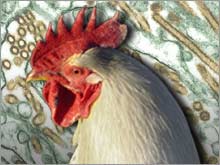|
Biotech stocks surge on bird flu scare
BioCryst stock climbs 15 percent after members of Indonesian family are killed by bird flu.
NEW YORK (CNNMoney.com) - Stock prices for biotechs developing bird flu drugs and vaccines surged, following news that six members of an Indonesian family died from the dreaded bird flu, sparking fears of human-to-human spreading despite official denials of a mutated strain. The stock price for BioCryst Pharmaceutical (up $1.16 to $12.96, Research), an Alabama biotech that is developing the anti-viral Peramivir, surged 15 percent in morning trading. The drug is being tested as a treatment for H5N1, the bird flu virus that has infected 218 people worldwide and killed 124, according to the World Health Organization.
Other bird flu biotechs made hefty jumps, with Generex Biotechnology (up $0.20 to $2.04, Research) up 13 percent, a 12 percent increase for Novavax (up $0.49 to $5.17, Research), an 11 percent surge for Peregrine Pharmaceuticals (up $0.09 to $1.50, Research) and Avi Biopharma (up $0.13 to $4.75, Research) rising 6 percent. "The entire space is up today and it's because bird flu has hit the front page again, and the potential for human-to-human spreading is being talked about, though the WHO is not changing their status [on the virus,]" said Ren Benjamin, analyst for Rodman & Renshaw. Benjamin warned that stock prices could fall once the news furor over bird flu dies down, and said he has noticed this pattern in previous news cycles. Vinny Jindal, analyst for ThinkEquity, said the stock surge is "clearly a reaction to the headlines," but it's not just hype. Jindal said that BioCryst "is still undervalued relative to their prospects in avian flu," partly because Peramivir is in the advanced stages of testing. Jindal has a price target of $28 for the company, more than twice its current value. H5N1 emerged in Asia and has spread widely, to Europe, the Middle East and Africa. Humans get infected with H5N1 from close contact with birds. In earlier cases, a pair of Vietnamese brothers became infected when they ate raw duck blood pudding, and Turkish girls got the virus by playing with severed chicken heads. The U.S. government is gearing up for a possible pandemic here, out of fears the virus could mutate into a form that would be spread among humans. The fears increased when researchers recently discovered that the viral pandemic that killed tens of millions of people in 1918 and 1919 originated in birds and apparently mutated into a human-transmitted strain. WHO spokesman Peter Cordingley said on Wednesday that the H5N1 virus had not mutated and has "not developed the ability to jump more easily from chickens to humans, nor spread among humans more easily." But Cordingley also said the Indonesian family lived in cramped quarters and apparently became infected through "close and prolonged exposure to a patient during a phase of severe illness." Congress recently appropriated $3.3 billion for fiscal year 2006 for pandemic preparations, according to Health and Human Services. As part of that funding, the HHS on May 5 awarded $1 billion to drug makers, including $700 million to GlaxoSmithKline (down $1.05 to $54.82, Research), Novartis (down $0.73 to $55.77, Research) and MedImmune (up $0.87 to $30.20, Research), to develop a faster way of making H5N1 vaccines. Roche, the Swiss drug giant, produces Tamiflu, the only anti-viral on the market that is used to treat bird flu. Demands for the company's drug have outstripped supply and Roche has collaborated with other companies to ramp up manufacturing capacity. French drug giant Sanofi-Aventis (down $0.45 to $46.87, Research) is considered a lead company in developing a bird flu vaccine, and has also been awarded with U.S. government contracts. The analysts interviewed for this story do not own shares in the biotechs mentioned here, though Rodman & Renshaw has done banking business with Avi Biopharma and Novavax.
Which came first, the bird flu vaccine or the egg? Click here to find out. |
|

